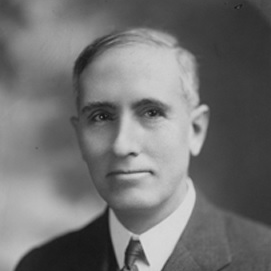Presidential Address
Persistent Problems of Church and State
In Memoriam
From the American Historical Review 53:1 (October 1947)
Evarts Boutell Greene (July 8, 1870–June 27, 1947). The death of Evarts Boutell Greene, June 24, closed a long and distinguished career as teacher and contributor to the history of colonial America. To everyone who knew him, either during his residence at the University of Illinois, or his later years in Columbia University, or through his services to the American Historical Association, his death brings a poignant sense of personal loss. He was one of God’s noblemen, the embodiment of what we mean when we say “a scholar and a gentleman.”
Evarts Greene was born in Japan seventy-seven years ago, the son of Daniel Crosby Greene, a distinguished and well-loved missionary from 1869 to his death in 1913 in Tokyo. The son Evarts was the first of four distinguished sons to return to America to complete his education. After three years in Northwestern University he transferred to Harvard University, where he graduated in 1890, and where, three years later, he received his doctor’s degree, followed by a year’s fellowship spent in study in Germany. His first and longest association, from 1894 to 1923, was with the University of Illinois where, as a professor and head of the department and as dean of the arts college, he helped build that institution up to front rank among state universities. That was especially true of the department of history. But academic administration in a dean’s office was distasteful to him. A professorship in Columbia University, however sharp the change, offered a chance to devote himself more completely to teaching and to his own research. From 1923 to his retirement in 1939, from 1926 as DeWitt Clinton professor, he added distinction and gave faithful service to the department on Morningside Heights. For his civic and scholarly services to the Historical Library Centennial Commission in Illinois, he substituted services to similar groups in New York City. In addition to this, he had, during close to a score of years, served on almost every committee and held nearly every honorary office in the American Historical Association closing with the presidency in 1930. Membership in learned societies and honorary degrees were his in full measure.
As a writer and editor of documents, Professor Greene’s work was marked by painstaking care at every point rather than by facile writing or bold generalizations. The caution of the scholar reinforced the innate restraint of the man. His first published work, The Provincial Governor in the English Colonies of North America (1898), was a model of its kind. His volume in “The American Nation” series was on Provincial America (1905). To the Fox-Schlesinger series on the “History of American Life,” he contributed the volume, The Revolutionary Generation, 1763–1790 (1943). Other useful volumes were a college text on the colonial period and, with R. B. Morris, A Guide to the Sources for Early American History in New York City. One should add the title that would be perhaps his own favorite, Religion and the State in America ( 1941 ), and also the tribute to his father in A New Englander in Japan (1927). A congenial home was always his through the devotion of his sisters, for Professor Greene never married. He died at Croton-on-the-Hudson, New York, where the gentle and somewhat absentminded professor had made his place in the community, and it pleased him that his last honor ,vas to be elected to the local Rotary Club.
Bibliography
The government of Illinois; its history and administration, by Evarts Boutell Greene. New York, The Macmillan company; London, Macmillan & co., ltd., 1904.
Lieber and Schurz, two loyal Americans of German birth, by Evarts B. Greene. Issued by the Committee on Public Information: Washington, D.C. 1918.
The foundations of American nationality, by Evarts Boutell Greene … New York, Cincinnati: American Book Company, 1922.
A guide to the principal sources for early American history (1600-1800) in the city of New York, by Evarts B. Greene and Richard B. Morris. New York: Columbia University Press, 1929.
Religion and the state; the making and testing of an American tradition, by Evarts B. Greene. New York: New York University Press; London, H. Milford, Oxford University Press, 1941; Reprint, New York: AMS Press, 1976.
The revolutionary generation, 1763-1790, by Evarts Boutell Greene. New York: The Macmillan company, 1943.
Provincial America, 1690-1740. New York, F. Ungar Pub. Co., 1964; Reprint, Westport, Conn.: Greenwood Press, 1980.
American population before the federal census of 1790, by Evarts B. Greene … and Virginia D. Harrington. New York, Columbia University Press, 1932; Reprint, Baltimore: Genealogical Pub. Co., 1993.
